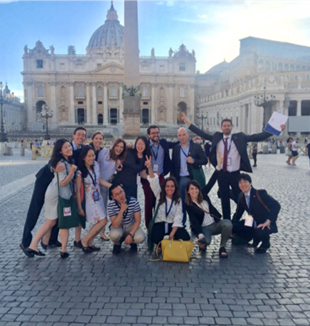
Science and Life at the Vatican
Evelyn recounts her experience participating in the annual assembly of the Pontifical Academy for Life at the Vatican last June.Last June, I had the good fortune of participating in the annual assembly of the Pontifical Academy for Life (PAL) at the Vatican, as one of the new youth members. The Academy is undergoing a transition including the creation of a young members section (under 35 years) who work on issues of life. Given my research on human neuroscience and neuroimaging, Sabrina Paganoni in Boston recommended my name to her dear friend Fr. Roberto Colombo, a scientist, professor, and longtime member of the PAL. Suddenly I found myself part a small group with members from various continents that included researchers, health care professionals, and lawyers, writing on the concerns of young scientists read at the Synod of Bishops. Our first task was to write a letter on the concerns of young researchers that was presented at the Synod of Bishops. My experience in Communion and Liberation was really helpful in emphasizing the use of reason when considering how to serve God and work well, in addition to making me comfortable in sharing concrete experiences (with complete strangers) instead of starting from lofty ideas.
The 2018 theme was “Global bioethics,” which encompasses traditional Catholic concerns on the beginning of life and end of life, to a broader consideration about sustainability, human relationships and the family, ecology, human migration, etc. (as we hear from Pope Francis or in Laudato Si). It was fascinating to see that the Church brings a humanity that the whole world needs. For instance, a common concern on how we accompany the sick and dying was shared by the Rabbis, Anglican priests, as well as Catholic doctors and priests. How can we pay attention to the whole person or have a holistic view of the person in today’s context? I saw how our faith can generate hope and dedicated work towards greater dignity and justice for all, while our reflections on today’s challenges equipped us to better interact with the world and be of service. In another example, I learned how the many new “choices” provided by medical technology can paradoxically create more anxiety and am now more aware of consequences from various family planning or pre-natal options. Connected to my own research, we discussed possible Catholic judgements on neuroethical issues such as brain enhancement -- a timely topic given the today’s pace of technological progress, which we hope to write a paper on.
I was especially grateful for a day just for the youth members in which we discussed concerns as believers and scientists, especially on how to live these two realities in a culture that increasingly reveres science but scorns religion. We were encouraged not to be afraid: while witnessing to the faith may have costs, one discovers unexpected connections or shared desires for meaning and truth. Several adult “veterans” shared their experiences as both successful professionals and passionate believers. For instance, we were encouraged to be bold and trust that truly following the scientific method can help illuminate the teachings of the Church on issues of life -- there is no contradiction. Or, we spoke of balancing a demanding scientific career with a lively personal life through adhering to reality and the path given, even if it may seem unorthodox. I was cheered and inspired by the creativity, passion, and persistence apparent in their unique journeys. Overall, participating in this community, meeting Pope Francis, and being immersed in the splendor of the Vatican, all strengthened me in my personal faith and work commitments.
I believe the Church is in a vital moment of broadening her horizon to be of increasing relevance and learning to communicate that more effectively. The PAL is young (established a quarter century ago) compared to the older Pontifical Academy of Sciences (which existed in Galileo’s time). Nevertheless, I believe that in this century, issues of life are at the forefront, making this dialogue important for everyone. I would be glad to share my experience, facilitate conversations, or share PAL materials, and invite those interested to get in touch or follow our activities via social media. Members of Communion and Liberation especially have so much to contribute because of our desire to engage with reality, and our commitment to issues of life including medicine, education, and research. I look forward to walking with all of you, and thank you for your support and prayers for our upcoming endeavors!
Evelyn, Pennsylvania, USA